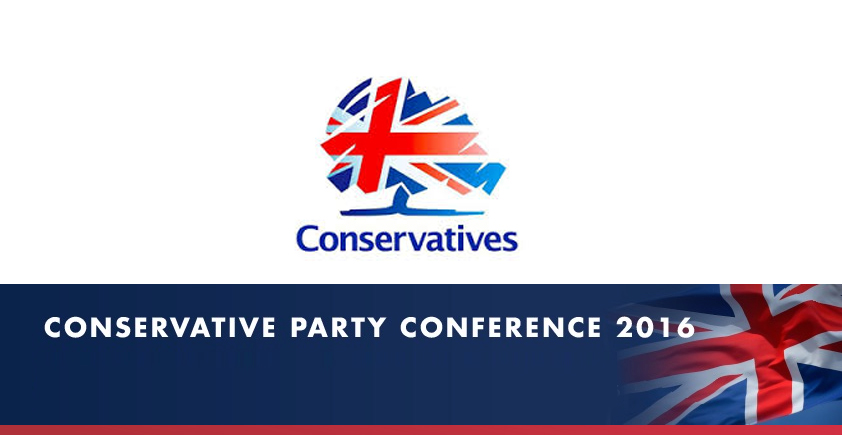Luther’s take on Conservative Party Conference 2016

With Labour having spent the last few months in total chaos the Conservatives came to conference knowing they are in a commanding position and there was certainly a huge effort to ensure that ministers spoke with a united voice about the Prime Minister’s agenda of building ‘a country that works for everyone’. The membership seemed broadly happy with Prime Minister May – something that was far from guaranteed in July – and her presence at almost every major reception on Sunday night went down with cheers and rapturous applause.
May’s pitch is to reach out to the working class and suburban ‘Leave’ voters, left stranded by Labour and perplexed by UKIP. Understanding that many of these voters want small ‘c’ Conservative policies to provide them with security in a rapidly changing world, she criticised ‘dysfunctional businesses’, pledged to protect worker’s rights and set out ambitions for industrial intervention. Change was certainly the buzzword of the speech, and it is as much about change from the Cameron regime as it is about meeting the challenges of Brexit.
But to deliver this change she is conscious of the need for democratic legitimacy, particularly when there is a small majority in the Commons and more importantly no majority at all in the Lords. Her thesis is that the referendum result is a sign of a much broader disaffection amongst voters with the economy, society and the political system and therefore this warrants the realignment of domestic policy. Indeed this view was repeated by ministers loyal to Number 10 consistently throughout the conference.
What didn’t change about conference was the highly staged managed approach that became the standard operating model of the Cameron era. There was little detail in Cabinet ministers speeches and few major announcements of note to point to. The economic detail, the Chancellor said, would come in the Autumn Statement – a huge amount of pressure is now resting on 23 November – and there were some announcements on boosting house building. Instead this conference was about perceptions launching a new approach to government.
The cost of housing has clearly been identified as a key issue for the Conservatives to address in order to not be caught on the wrong side of the public mood. Sajid Javid was clear that housing will be the number one ministerial team priority with devolution and local government issues likely to be left to officials to take forward the processes which are already underway.
George Freeman – former life science minister and now chair of the No.10 Policy Board – did a number of fringes and broadcast interviews and seemed to be taking a role as an intermediary with business. As a business-minded former Remainer, he suggested that all asks on Brexit should be framed in terms of their additional impact on the Government’s domestic priorities on trust and fairness. Like Greg Clark in his conference speech, he was quick to emphasise that to thrive post-Brexit, the UK will need to find areas in which it can carve out a niche of world leading innovation, given that our wage levels and the terms of Brexit mean that we will never be able to compete in a race to the bottom.
Freeman highlighted bio tech and agriculture and personalised medicines areas where – free of Europe – the UK could come up with a better regulatory regime that would allow us to become a test bed for innovation and share that in new markets, particularly in the developing world.
But there was no getting away from Brexit. Despite the best efforts of Downing Street to restrict the discussion on leaving the EU to the Sunday afternoon, the issue was almost the sole topic of discussion at the fringe – that and housing (Gavin Barwell apparently spoke at no less than 17 events on the issue). Conference goers were truly spoilt for the vast array of events to learn about the effect Brexit would have on every conceivable sector and industry.
People came to conference looking for some answers and certainly more detail on the Government’s approach – we now know that Article 50 will be triggered before the end of March, and that there will be a Great Repeal Bill which will transfer and then begin the repel process of EU law in the UK. Both of which sets the Government increasingly on a path of a ‘hard-er’ Brexit than many ministers had previously been willing to admit.
What conference did confirm once and for all is that the Government views Brexit almost entirely through the prism of immigration control, and it very much felt that the single market issue was increasingly taking on a secondary priority. This led to arguments being played out about the nature of ‘hard’ Brexit. Many ministers – including those who had previously suggested they favoured a softer approach were now saying that the “certainty and clarity to business” that a swift exit would provide, may be favourable to years of protracted negotiations. A subtle change in emphasis, but an important one because it shifts the nature of Hard Brexit from a principled stance (primarily held by Leavers) to one of pragmatic necessity (now taken up somewhat apologetically by Remainers).
The Prime Minister gave further credence to this shift throughout the week, suggesting that UK businesses would still be able to ‘operate within’ the single market – without fully clarifying what ‘within’ really meant. She continues to stress that a unique deal for the UK is the Government’s favoured outcome but the ease with which the discussion moves to WTO rules is worrying some.
Despite the continuing uncertainty, one thing is definite – there’s going to be many bumps along the road…
